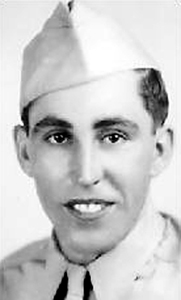CARL GROMEAUX DIDN’T WANT TO TALK ABOUT IT – PT. 2
 Continued From The April 12 Edition.
Continued From The April 12 Edition.
Life as a POW
When they finally made it to Stalag IX-B they were crowded into large open buildings with leaky roofs and missing windows. It was midwinter in Germany. Most of the men had only the clothes on their backs; some of the less fortunate didn’t have coats. The barracks had a potbelly stove in the center and they received a ration of one armload of wood a day to keep them warm. At night they were forced to extinguish the flame, supposedly to avoid detection. The toilets were a “hole in the floor” at each end of the building leading to a trench that had to be cleaned out daily.
Anything of value the men carried had been confiscated by the guards on the train. Carl showed me how he kept his watch – an Army enlistment gift from his sister – by pushing it high on his forearm out of view of the guards. He eventually sold the watch for $2 and used the money to buy cigarettes. He said that it was more out of boredom than the actual desire for a cigarette. “We traded, bought and sold whatever we could just to pass the time.
Me and my buddy, we made those cigarettes last for weeks, we would light one take a few puffs then put it out.”
Recounting this brought another visibly painful memory to mind. While in the camp Carl had volunteered to dig the graves of his fellow soldiers, because he wanted them to have a decent burial, and because he thought that the extra ration he received for this duty may keep him alive another day. All soldiers know that Article 3 of the US Code of Conduct states that a prisoner shall never accept “special favors” from the enemy. This was one of the many things that haunted Carl, even into his final years. My reassurance that most anyone would have done the same was little consolation to a man who came home and went on with life, like the whole nightmare had never happened. He just didn’t talk about it.
The prison camp was segregated by fences and the Americans were not allowed to speak with any foreign prisoners. The French were forced to march daily. Carl surmised it was as much to keep them occupied as it was to remain in shape and to reinforce discipline. As the camp was composed entirely of enlisted men, they elected one of their own to be the “Man of Confidence.” He was the one who took their grievances to the camp command; negotiating rules, discipline and work schedules.
Speaking of the Confidence Man provoked another memory of the night—two of his fellow prisoners took a potato while on kitchen duty. When the Germans found out all the U.S. Servicemen were forced to stand in the frigid cold for hours. Finally the “Man of Confidence” was able to convince the Germans to allow the men back into the barracks. The deal was the men would go without food until the mystery of the stolen potato was solved. Carl credited the man with saving their lives that night.
Located outside the city of Bad Orb, Germany the Prison Camp Stalag IX-B, was known for poor conditions, and considered by many, to be the worst in the German system. Food rations were barely enough to keep the men alive and there was no medical attention available.
When “daily” rations were doled out they consisted of a piece of bread in the morning and a ladle of soup in the afternoon. When Carl said “soup” he laughed. “They called it soup. Actually it was water with some grain, sticks, and potatoes but rarely any other vegetable.” On a good day when one of the retired military horses, which the Germans used to haul firewood, died they had meat for several days. He then added “you tried not to think about it.”
Another staple of prisoner life was a drink that the Germans called “coffee.” Carl said that it was made with pine tops and barley. He would reach into the pot and take out the barley and eat it. It helped him make it through the day. Once spring arrived dandelions began to sprout. Carl would reach through the barbed-wire perimeter fence and grab the greens and eat them. “City-slickers” and the Germans laughed at him, but eventually they were all fighting for the dandelions.
Sleeping arrangements were another thing that brought a faint smile to Carl’s face. He explained, “We were two men to a bed with one blanket. When your bed mate rolled over you rolled over too.” They huddled together to stay warm; the smell didn’t matter since most of them hadn’t showered in more than a year. For Carl it had been “just a few months” which again brought the smile.
Because the men hadn’t showered and were forced to live in filthy conditions lice was a big problem. The lice lived in the seams of their clothing and became more active at night. Some men not able to stand the constant chewing of the lice would strip bare and roll around on the frozen ground to relieve the itching.
When I asked about mail he told me they were allowed to write home, but they found out later that the letters never left the camp. The Germans would read what the prisoners had written, hoping to gather intelligence information, then burn the mail.
Carl’s mother did finally receive notification of his prisoner status in March of 1945. He had previously been listed as “Missing in Action.”
By late March the Germans were starting to see the writing on the wall. They, like the prisoners they guarded, were tired, cold and hungry. One elderly guard came into the barracks each night to count the prisoners and would often ask, “when are your men getting here?” Carl said, “They were done – by the 2nd of April when we could hear our tanks coming, the German camp commander allowed all his men to leave and he alone waited at the main gate to surrender to the American Forces.”
The liberating American Forces brought military rations to the men who had been on a very limited mostly liquid diet, some of them for over a year. Carl, who had lost 35 pounds during his captivity said, “That wasn’t good.” To put it politely, the stomach problems caused widespread trouble in the camp. Stomach problems continued to plague Carl for the rest of his life.
After they were liberated some of the men went into the town of Bad Orb and took bread and marmalade from the stores there. They also took several bottles of Cognac and celebrated their new found freedom.
The French soldiers, with no hope of hitching a ride, took off on foot en route home. Carl remembered the French left early in the morning of their first full day of freedom. He described how from his vantage point at the POW camp high in the hills he could still see them marching into the distance as the sun set that evening.
After a couple more days the U.S. soldiers were trucked to an airfield three miles away. There they were taken into a shower tent bathed then powdered with DDT and were given new clothes. Their old clothes were doused with gasoline and set ablaze, along with the tent. They boarded a U.S. cargo plane and were taken to La Rochelle on the western coast of France, where they boarded a ship home.
Four weeks later they were in America.
After the War
The first stop was a military hospital in South Florida, where Carl had the chance to meet up with his brother “Fudge” who was still recuperating from a gunshot wound to his head. Carl spent a week there, then took a bus to Camp Atterbury; a military base South of Indianapolis, where even today young men and women still regroup after returning from combat.
After a few more days of paperwork, medical appointments and de-briefing he took the bus to Fort Wayne, where his brother-in-law picked him up. They went by car south to the General Electric plant in Decatur, Indiana where his fiancée, Dorothy Murphy, worked. He went on to describe an experience reminiscent of the factory scene from the movie “An Officer and a Gentleman.” The war was still going on and security was tight at the factory that produced items critical to the defense of our Nation. The guard realized who Carl was and allowed him in, by the time they embraced, everyone in the area realized what was happening – as they broke into applause, “Tears were a flyin!” Carl said.
He straightened himself in the hospital chair, no longer looking like an ailing man of 91 harboring years of painful memories, tears flowed freely from his eyes as he smiled widely and said, “Yep, she waited for me.”
Carl married the love of his life on September 22, 1945, a month after he was hired at International Harvester where he worked for the next 30 years.
Carl served as the Grand Marshall of the Monroeville Days Parade in 1995. He was celebrating 50 years of freedom. At that time there were very few people that knew his story. I wanted to honor this member of the “Greatest Generation” by telling it now.
Private First Class Carl A. Gromeaux passed away peacefully in his sleep at home on January 30, 2013. He was 93 years old. He is survived by his wife Dorothy and daughters Sheila (James) Harrington and Andrea (Dale) Gromeaux-Schnaith, three grandchildren and seven great-grandchildren.
There’s no one around today who saw Carl’s face on that day back in early April of 1945 when the tanks and men of the 44th Infantry Division and the 106th Cavalry Group came rumbling up from the forest to liberate them, but I can’t imagine the emotion was much different than what I saw that day he finally shared with me the intimate details of his time as a Prisoner of War.
Carl Gromeaux didn’t want to talk about it. Now I understand why.
- Celebrating 20 Years Of Community At The Stand - April 12, 2024
- First Positive Case Of Chronic Wasting Disease In Indiana - April 12, 2024
- Southwest Allen County Schools Embark On Major Tree Plantings - April 12, 2024


